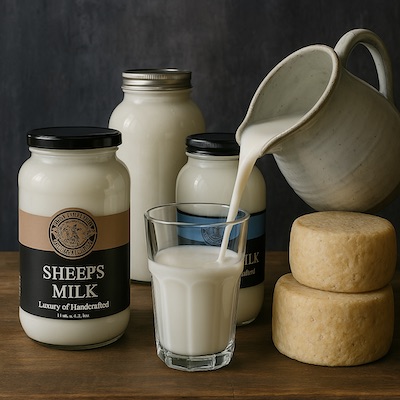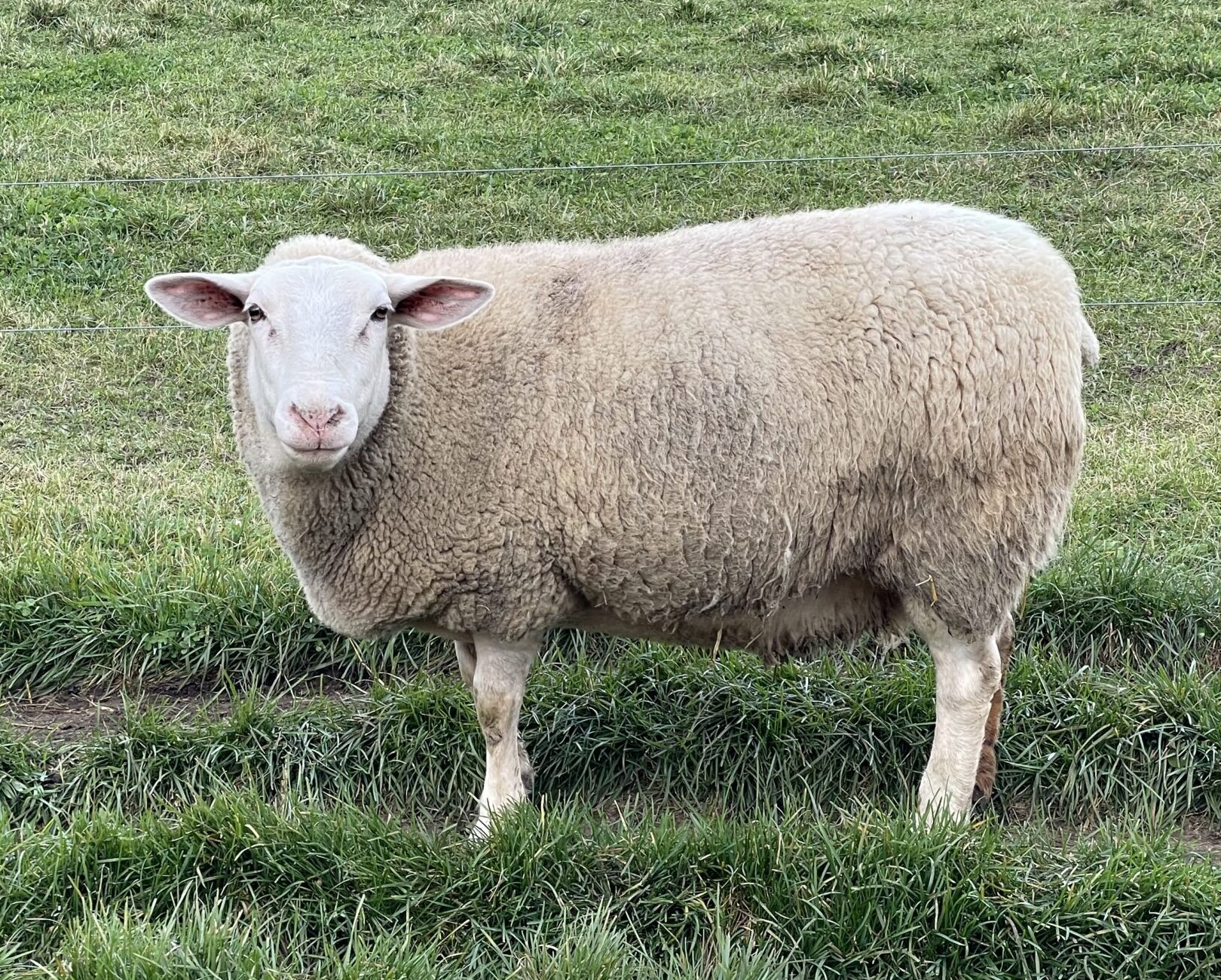Lactose intolerance is a common condition, and many people seek out lactose-free dairy products or other alternatives to avoid digestive discomfort. Lactose-free cow’s milk from the grocery store is a popular solution, but natural sheep milk dairy offers a different approach. In this article, we’ll compare lactose-free cow milk with sheep’s milk, looking at how they’re made, their nutritional facts, and why sheep milk’s A2 protein and low lactose levels can make it gentler on digestion. Our goal is a clear, easy-to-read comparison that helps you make informed dairy choices.
Understanding Lactose Intolerance and Dairy Sensitivity
Lactose intolerance isn’t a milk allergy – it simply means your body doesn’t produce enough lactase, the enzyme needed to digest lactose (the sugar in milk). Undigested lactose ends up fermented by gut bacteria, leading to gas, bloating, and cramps. This can make a glass of regular milk quite uncomfortable for individuals with lactose intolerance. As a result, many people turn to lactose-free dairy products or non-dairy milk alternatives. To enjoy cereal, coffee, or smoothies without experiencing discomfort.
However, it’s important to note that not all tummy trouble from dairy is caused by lactose. Some people who believe they have lactose intolerance might actually be sensitive to cow’s milk proteins or fats instead. The symptoms can be the same, which can be confusing. True lactose intolerance (especially in adults of European descent) is less common than commonly assumed. If you still experience discomfort after switching to lactose-free milk, something else in the milk may be causing an upset stomach. This is where understanding milk proteins becomes crucial.
What Is Lactose-Free Milk, and How Is It Made?
Lactose-free cow’s milk is basically regular milk that has been treated to break down lactose. Manufacturers add the lactase enzyme to the milk, which “pre-digests” lactose into simpler sugars (glucose and galactose). This process addresses the lactose issue – the resulting milk contains the same total sugars, just in a form that lactose-intolerant individuals can absorb. (If you’ve ever noticed lactose-free milk tastes a bit sweeter, that’s because glucose and galactose trigger our sweet taste buds more than lactose does.) After adding the enzyme, the milk is often ultra-pasteurized to deactivate the lactase and extend shelf life.
The benefit: Lactose-free milk allows those with lactose intolerance to drink cow’s milk without the gas and bloating. It retains all the vitamins, minerals, and proteins of regular milk. You can find lactose-free versions of many dairy products (milk, yogurt, ice cream, etc.) at the grocery store.
The catch: what lactose-free processing doesn’t change is the protein in the milk. It’s still ordinary cow’s milk in that regard, containing the same casein and whey proteins. For most people, that’s fine, but if you have a sensitivity to cow’s milk protein, simply removing lactose won’t solve your digestive issues. In fact, many people continue to experience discomfort with lactose-free dairy because of a protein called beta-casein. Regular cows produce a form of beta-casein known as A1, and research suggests this protein can irritate the gut in some individuals. To understand why, let’s look at A1 vs A2 proteins.
The Hidden Culprit: A1 vs. A2 Beta-Casein Proteins
Not all milk proteins are equal. Cow’s milk has several types of casein proteins, and there are two genetic variants of the beta-casein fraction, called A1 and A2. Most modern dairy cows (Holsteins, for example) produce a mix of A1 and A2 beta-casein. The difference between them is slight (just one amino acid), but it has a significant impact on digestion. When A1 beta-casein breaks down in the gut, it releases a peptide called beta-casomorphin-7 (BCM7). BCM7 can trigger inflammation, slow down digestion, and even compromise the integrity of the intestinal lining. In simpler terms, A1 protein can act as an irritant in the digestive systems of susceptible individuals. Leading to symptoms such as gas, stomach pain, and a longer transit time through the gut.
Clinical trials
By contrast, A2 beta-casein (produced by certain cow breeds, as well as sheep, goats, and humans) does not release that troublesome peptide in significant amounts. A2 protein is not associated with the digestive distress that A1 protein can cause. A growing body of research supports this: for example, a clinical trial found that people experienced significantly more post-dairy digestive discomfort and inflammation after drinking milk with A1 (regular cow milk) compared to milk with only A2 protein. Both milks in that study contained the same amount of lactose, which reinforces the notion that the A1 protein was the factor exacerbating people’s symptoms. In fact, the researchers concluded that in many lactose-intolerant subjects, A1 beta-casein was likely the real culprit for their stomach issues rather than lactose itself.
What does this mean for your lactose-free milk? Most lactose-free dairy products are made from regular cow’s milk, so they contain A1 beta-casein unless specifically labeled otherwise. The lactase enzyme solves the sugar problem, but the A1 protein remains. If you have an A1 sensitivity, you may still experience an upset stomach, even if the product is labeled as “lactose-free.” This is why some consumers find that lactose-free milk doesn’t completely solve their issues.
On the other hand, dairy that comes from A2-only sources can be more “gut-friendly.” In New Zealand and Australia, a special A2 Milk (from cows bred to produce only A2 beta-casein) has become popular for people with dairy intolerance. But an even more natural source of A2 milk is sheep milk – which has only A2-type beta-casein, not a trace of A1. Sheep and goats naturally produce A2 milk. So they offer an alternative that addresses both the lactose issue and the protein issue in one package.
Sheep Milk: A Natural A2 Dairy That’s Gentle on Digestion
Sheep’s milk is often touted as being easier to digest than cow’s milk, and there’s good reason for that. First, as mentioned, sheep milk contains only A2 beta-casein, so it lacks the A1 protein that can cause gastrointestinal irritation. If your “lactose intolerance” symptoms are actually due to a sensitivity to A1 protein, switching to sheep milk could relieve those digestive issues. In essence, sheep milk addresses the hidden culprit that lactose-free cow milk might still be leaving in play.
Secondly, what about lactose itself? Sheep milk, like all animal milks, does contain lactose, roughly in the same ballpark as cow’s milk (~4-5% by weight). It is not completely lactose-free, so someone with a severe lactose intolerance (no lactase production at all) should be cautious. That said, the lactose content in sheep’s milk can be a bit lower depending on the sheep breed and feed. (Individuals with severe lactose intolerance (who lack lactase production) should exercise caution with cow milk.)
Unharmful dairy
In a New Zealand trial with dairy-sensitive individuals, sheep milk caused significantly less hydrogen gas production (a marker of undigested lactose) than cow’s milk, likely due to that lower lactose content. Importantly, despite being richer in nutrients (higher in fat and protein), sheep milk did not lead to more digestive symptoms compared to cow milk in these participants. In other words, the sheep milk was tolerated at least as well as the cow milk. Even among people who usually avoid dairy.
Furthermore, many sheep dairy products are naturally low in lactose because of how they’re made. Sheep’s milk is commonly used for yogurts and cheeses (think feta, pecorino, Roquefort), and during fermentation, the lactose is broken down by bacteria. Aged sheep cheeses and cultured sheep yogurt contain minimal lactose, so even many truly lactose-intolerant individuals can enjoy these products without trouble. For example, a well-aged sheep cheese has nearly zero grams of lactose, making it a safe choice for those with lactose intolerance, while still delivering protein and calcium. This fermentation advantage is something to consider if you’re looking for lactose-friendly dairy options.
Nutritional Benefits of Sheep Milk (Beyond Digestibility)
Aside from digestibility, sheep milk brings a powerhouse of nutrition to the table. It is one of the most nutrient-dense milks available. Sheep’s milk contains more protein, healthy fats, vitamins, and minerals per serving than cow’s milk. Here are a few highlights of how sheep milk compares to standard whole cow’s milk:
Higher Protein
Sheep milk provides about 5.4 grams of protein per 100 grams, versus ~3.2 grams in cow’s milk. That’s roughly 60% more protein, including all essential amino acids. In fact, a recent study confirmed that sheep milk delivers more branched-chain amino acids (important for muscle building). Because its proteins are more fully digested and absorbed. This high-quality protein can benefit growing children, athletes, and individuals seeking to naturally increase their protein intake.
Rich in Vitamins and Minerals
Sheep milk is exceptionally rich in minerals like calcium and zinc. Per 100g, it contains approximately 193 mg of calcium, nearly double the amount found in the same amount of cow’s milk. Zinc content is likewise almost twice as high. It also contains more magnesium and phosphorus. In terms of vitamins, sheep milk has higher levels of B vitamins, such as B12 and folate, as well as higher levels of vitamin D on average. This contributes to strong bones and a healthy immune system. Not only is there more calcium in sheep milk, but studies suggest this calcium is also more bioavailable. The structure of sheep milk forms smaller fat-protein clusters (micelles) that deliver calcium efficiently to the body.
Healthy Fats
Yes, sheep milk is higher in fat (about twice the fat of cow or goat milk). But a large portion of these are medium-chain fatty acids (MCFAs) and conjugated linoleic acid (CLA). These types of fats are digested faster and used by the body for energy rather than being stored. The fat globules in sheep milk are also naturally smaller. Which makes the milk very creamy and easier to digest, and less likely to cause issues like high cholesterol. Many people find sheep milk dairy doesn’t feel as heavy in the stomach despite its richness. Plus, CLA and MCFAs have been linked to health benefits such as improved metabolism and anti-inflammatory effects.
Naturally Homogenized
Sheep milk’s smaller fat globules mean the cream stays evenly dispersed (the milk is “naturally homogenized”). This yields a smooth texture and may aid digestion. You get a rich, velvety milk without the processing that cow milk usually requires.
All these nutritional advantages come together with the digestibility benefits. Researchers from the University of Auckland who studied sheep milk note that it has “inherent properties which mean we digest it differently.” They found sheep milk proteins are more readily digested than those in cow’s milk. They are ,delivering more nutrition (like amino acids) with less gastric discomfort. The study co-lead Dr. Amber Milan pointed out that New Zealand sheep milk has “almost twice the level of calcium and zinc compared to cow milk,” and confirmed that these differences translate into real physiological effects. In short, sheep milk isn’t just a workaround for lactose – it’s a nutrient-rich, easily digestible food in its own right.
Choosing the Right Dairy (and Why We Love Sheep Dairy)
When it comes to managing lactose intolerance or general dairy sensitivity, knowledge is power. Lactose-free cow’s milk from the store can be a great solution if lactose is your only issue – it lets you enjoy the taste and nutrition of dairy without the lactose load. However, it doesn’t address other potential culprits, such as the A1 protein. If you’ve tried lactose-free products and still experience discomfort, you may want to consider a different approach.
Natural Alternative
Sheep’s milk dairy offers a natural alternative that addresses both problems. It is free of A1 beta-casein, and many people find it gentler on the gut. Yet it still provides lactose in a more tolerable form (especially in fermented forms). In fact, researchers have called the recent evidence on A1 vs A2 “good news for consumers who struggle with the digestion of cow’s milk,” as it opens up new options for enjoying dairy without pain. Sheep milk, being an A2 milk, is one of those options. Many individuals report that they can drink sheep or goat milk, or eat cheeses made from them, without experiencing the issues they encounter with cow dairy. Everyone is different, of course, so it’s wise to listen to your body and maybe consult with a healthcare provider if you have severe intolerances or a diagnosed dairy allergy (which is a different condition altogether).
Rediscover dairy for yourself
From a general wellness perspective, sheep milk can be considered a “healthier dairy” choice because of its digestibility and dense nutrition. It allows you to get all the protein, calcium, and other benefits of dairy – often in even greater amounts than cow’s milk – without as much risk of stomach upset. This can be especially valuable for those who have given up on dairy due to past problems. For example, an older adult who can’t handle cow milk may find they thrive on a sheep or goat milk yogurt, getting calcium for their bones and protein for muscle maintenance, minus the bloating.
At Secret Lands Farm, we take pride in being part of this dairy solution. We’re a family-run sheep dairy farm in Ontario, and we ship our farm-fresh sheep milk products across Canada. Our East Friesian sheep produce rich, A2-protein milk. That we craft into artisanal cheeses, creamy yogurt, and even bottled whole milk. We’ve seen firsthand how our customers with lactose intolerance or sensitive stomachs have fallen in love with sheep dairy. It’s fulfilling to hear someone say they can finally enjoy cheese again or drink a glass of milk without discomfort. Thanks to the natural qualities of sheep’s milk. We invite you to explore our product menu – from A2 milk to aged sheep’s cheese – and discover a dairy that is both nourishing and gentle on your digestion.
In summary
If you’re trying to decide between grocery-store lactose-free milk and natural sheep milk dairy, consider the following. Lactose-free cow’s milk eliminates lactose by adding lactase, but it still contains A1 protein, which may trouble sensitive individuals. Sheep milk, on the other hand, naturally contains low lactose (especially in fermented products) and only the gentle A2 protein. Making it a dairy option that many find easier to digest. It also packs extra nutrition that can bolster your diet. By choosing an option like sheep dairy (for example, the offerings from our Secret Lands Farm), you can enjoy the “rich and creamy” taste of real dairy with fewer worries about digestive upset. It’s dairy the way nature intended – simple, wholesome, and suitable for even the lactose-sensitive consumer. Here’s to happy tummies and healthy, delicious dairy!




